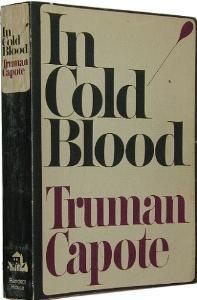Truman Capote

In Cold Blood (Photo credit: Wikipedia)
I aspired to be Truman Capote long before I read any of his works or even knew his name. This is because as far back as I can remember, I wanted to write a true story that read like an engaging novel. As a young girl I wrote short stories about things that happened around me and I modeled them after the fictional story books I read. I thought I was doing something unheard of. I didn’t know that somebody had already accomplished this feat until I was in my early teens and read Truman Capote’s In Cold Blood for the first time. Boy, did I feel silly. Since then, I’ve read In Cold Blood countless times, hoping – most likely in vain – to absorb some of Capote’s greatness.
Truman Capote was a flamboyant Southerner who charmed the high society bitches of New York. He was openly gay in a time when most homosexuals were still in the closet; a tiny man with an odd voice that has been likened to that of a “Brussel sprout, if a Brussel sprout could talk.” But he didn’t let any of this stop him from living large.
Born in New Orleans and abandoned by his parents to live with relatives in Monroeville, Alabama, Capote’s best childhood friend was literary great Nelle Harper Lee. The played together as children and she based the character “Dill” from To Kill a Mockingbird on Truman. What are the chances of two literary greats growing up on the same street?
The two were very close. In fact, Lee actually helped Capote research and write In Cold Blood. Unfortunately he did not give her credit for her valuable participation. At first this knowledge tarnished my reverence of him. But one day I came across a sentence that Lee had written for In Cold Blood describing killer Richard Hickock‘s oddly shaped face. (Lee is also a hero of mine and her writing surpasses what I dare to dream.) Anyway, Truman liked the sentence, but decided to brand it his own. Upon reading it, I forgave my quirky hero for his selfishness.
Lee wrote of Hickock’s face: It was as if someone cut it down the middle, then put it back together not quite in place.
The Truman brand: It was as though his head had been halved like an apple, then put together a fraction off center.
A minor change indeed. But it symbolizes Truman’s greatness.
Sadly, Truman Capote never wrote another book after In Cold Blood. From all I’ve read, the emotional strain of dealing with such a horrific subject sapped him of the drive to do so. I’ve written about horrible crimes and I know first hand that it eats away at the soul. You give up a piece of yourself with every chapter. For a writer, there is no choice. You can’t sleep at night until you get the words down. I wish readers could fully grasp that fact. If they could, even a mediocre book might somehow become great, given the knowledge of the raw, human investment it took just to write it down.





